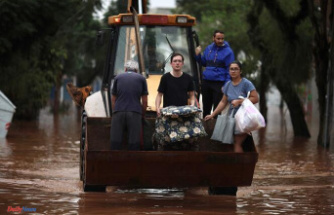Concerns about the spread of monkeypox are growing in the United States. After the World Health Organization declared a global emergency last weekend, the government of US President Joe Biden is considering a national emergency declaration. The areas of the country hardest hit by the outbreak are California and New York, where more than 40 percent of the 4,907 confirmed cases of monkeypox were reported. The state of New York and the city of San Francisco have now significantly tightened their measures to combat the virus.
New York declared monkeypox an "imminent public health threat" retroactive to June 1 after registering more than 1,200 cases, according to state health commissioner Mary T. Bassett on Thursday (local time). "This statement means that local health departments engaged in response and prevention efforts will be able to receive additional state reimbursements after exhausting other sources of federal and state funding to protect all New Yorkers and ultimately limit the spread of monkeypox in our communities," Bassett said, according to the Washington Post.
San Francisco Mayor London Breed also announced a local health emergency on Thursday, noting that the number of monkeypox cases had nearly doubled to 261 in a week. The move is intended to mobilize resources, expedite contingency planning and allow future costs to be reimbursed by the state and federal governments, Breed said.
"San Francisco has shown during Covid-19 that early action is essential to protect public health," the US broadcaster NBC News quoted the mayor as saying. "We know this virus is affecting everyone equally — but we also know that members of our LGBTQ community are at greater risk right now. Many people in our LGBTQ community are scared and frustrated. This local emergency will allow us to to continue to support the most vulnerable people while better preparing ourselves for what is to come."
Anyone in close contact with a monkeypox patient can become infected, but since the outbreak began, cases have mostly been in men who have sex with other men.
According to the Washington Post, local officials, including Breed, are complaining that the monkeypox vaccine supply is insufficient to immunize all those at high risk. "With our declaration of a state of emergency, we want to sound the alarm and make it clear that we urgently need more vaccines and more treatments," said Breed.
The Robert Koch Institute does not yet consider the outbreak situation in Germany to be worrying. "According to current knowledge, a risk to the health of the general population in Germany is considered to be low," says the RKI website. It still seems possible to limit the current outbreak in Germany if infections are recognized in good time and precautionary measures implemented. According to the institute, 2,540 cases of monkeypox were registered in Germany by Thursday. The Standing Vaccination Commission (Stiko) in Germany recommends vaccination against monkeypox for certain risk groups and people who have had close contact with infected people.
Sources: Washington Post, NBC News, Robert Koch Institute












